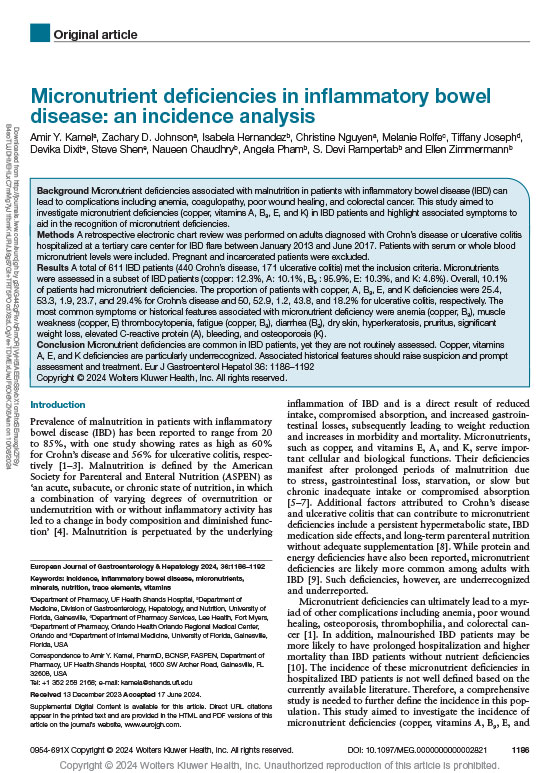Micronutrient deficiencies in inflammatory bowel disease: an incidence analysis
October 2024
European Journal of Gastroenterology & Hepatology
Background: Micronutrient deficiencies associated with malnutrition in patients with inflammatory bowel disease (IBD) can lead to complications including anemia, coagulopathy, poor wound healing, and colorectal cancer. This study aimed to investigate micronutrient deficiencies (copper, vitamins A, B9, E, and K) in IBD patients and highlight associated symptoms to aid in the recognition of micronutrient deficiencies.
Methods: A retrospective electronic chart review was performed on adults diagnosed with Crohn’s disease or ulcerative colitis hospitalized at a tertiary care center for IBD flare between January 2013 and June 2017. Patients with serum or whole blood micronutrient levels were included. Pregnant and incarcerated patients were excluded.
Results: A total of 611 IBD patients (440 Crohn’s disease, 171 ulcerative colitis) met the inclusion criteria. Micronutrients were assessed in a subset of IBD patients (copper: 12.3%, A: 10.1%, B9 : 95.9%, E: 10.3%, and K: 4.6%). Overall, 10.1% of patients had micronutrient deficiencies. The proportion of patients with copper, A, B9, E, and K deficiencies were 25.4, 53.3, 1.9, 23.7, and 29.4% for Crohn’s disease and 50, 52.9, 1.2, 43.8, and 18.2% for ulcerative colitis, respectively. The most common symptoms or historical features associated with micronutrient deficiency were anemia (copper, B9), muscle weakness (copper, E) thrombocytopenia, fatigue (copper, B9), diarrhea (B9), dry skin, hyperkeratosis, pruritus, significant weight loss, elevated C-reactive protein (A), bleeding, and osteoporosis (K).
Conclusion: Micronutrient deficiencies are common in IBD patients, yet they are not routinely assessed. Copper, vitamins A, E, and K deficiencies are particularly underrecognized. Associated historical features should raise suspicion and prompt assessment and treatment. Eur J Gastroenterol Hepatol 36: 1186–1192 Copyright © 2024 Wolters Kluwer Health, Inc. All rights reserved.

